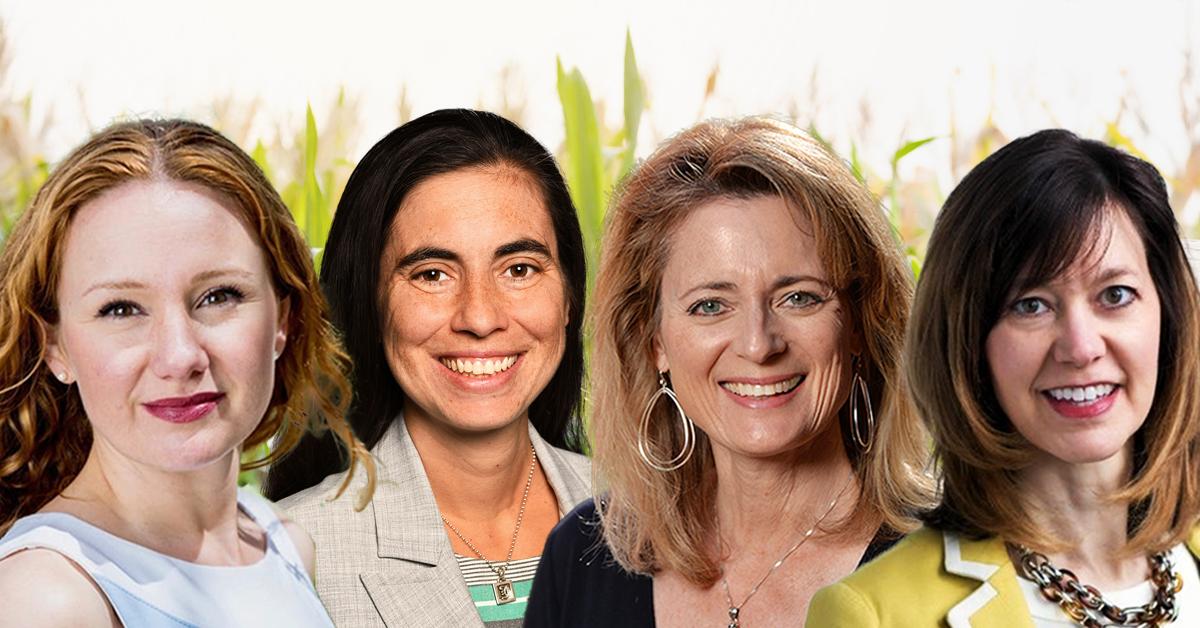Women's History Month: Introducing the SSCI Environmental Working Group
Published 04-07-23
Submitted by The Consumer Goods Forum

To mark Women’s History Month, the CGF sat down with members of the all-women team of the Sustainable Supply Chain Initiative’s (SSCI) Environmental Working Group (EWG). The EWG is leading the SSCI’s groundbreaking work to develop benchmark criteria for environmental sustainability standards to drive alignment and continuous improvement in the industry. Keep reading to hear about their careers in sustainability, how they came to join the EWG, and their reflections on the role of women in the sustainability field.
Tell us about your experience working in sustainability and how you came to participate in the SSCI Environmental Working Group.
Rita Bielinski, Director, Operations Sustainability, Land O’Lakes (RB): I have been interested in sustainability throughout my career and personal life. My corporate involvement began in the early 90s with the recycling team at General Mills, where I conducted a thorough sustainability audit to persuade leadership to recycle office paper. This was a revolutionary step at the time! From this experience, I learned most sustainability journeys start small and are best forged one step at a time. Currently, I lead Land O’Lakes’ enterprise-wide sustainability efforts as their Director of Operations Sustainability. In this role, I am challenged every day to pinpoint how we can integrate efficiencies into our operations and value chain that allow us to function more sustainably. In addition to helping our environment, our sustainability initiatives help ensure the longevity of our organisation and our farmers’ livelihoods, strengthening food security today to benefit us into the future. Upon accepting this role, I immediately became involved with the SSCI Environmental Working Group to continue making positive progress in our shared sustainability journey, one step at a time.
Janis McIntosh, Director of Marketing Innovation and Sustainability, Naturipe Farms (JM): My passion for sustainability came from my father, who introduced me to the joys and benefits of recycling at a very young age. In 1970s San Francisco, recycling wasn’t easy: it took dedication to collect, store, and drive your recycling across town to a collection event. Years later, when I visited Naturipe’s berry farms, I met farmers with the same passion for sustainability that my father showed me. I realised early on that growers were very modest and would only share their innovative and sustainable farming techniques if asked. I began collecting and cataloging their stories, not only because they are important in and of themselves, but consumers are also increasingly demanding information about products grown in a sustainable manner. Naturipe Farms has appreciated the value of the Sustainable Supply Chain Initiative from its inception and initially joined to have our social compliance expert, Donna Lynne Brown, participate in the development of the much-needed social auditing benchmark. I am now pleased to bring my focus on environmental sustainability to this Working Group.
Tamara Muruetagoiena, Director of Sustainability, International Fresh Produce Association (TM): I have been a sustainability professional since the beginning of my career as I always felt I needed to contribute to make the world a better place. I based my education in the sustainability trifecta: society-environment-economy, and spent many years in university studying political science, business administration, and environmental science. Professionally, my focus has been in natural resources working in forestry and agriculture. Believe it or not, I am passionate about the world of sustainability standards and the credibility they provide to sustainable businesses. As the Director of Sustainability at the International Fresh Produce Association, I feel very fortunate to have the opportunity to represent this industry at the SSCI and even Co-Chair the EWG.
Jessica Meisinger, Global Sustainability, Animal Health, Merck Animal Health (JLM): I have been interested in sustainability my whole life, including when it wasn’t very popular. When I was 16, I went to a meat processing plant for the first time and I was amazed at how they utilised the animal completely, letting nothing be wasted. I did my graduate work in Meat Science and Muscle Biology and am committed to the sustainability of animal agriculture. In my current role, I am able to both work on optimising our sustainability internally as well as help our customers with their sustainability journeys. A healthy animal produces sustainable food and it is my goal to help make the world a better place. I am therefore extremely happy to have the opportunity to Co-Chair the SSCI and to represent my industry.
The EWG has a stellar all-women team of sustainability experts, and gender equality is key to achieving the SDGs. Why is it important for women to have a voice in the sustainability field? In your view, how are women’s issues and sustainability challenges connected?
JM: For centuries our environment has been referred to as Mother Nature, who creates, nurtures, and protects. All these attributes are innately who we are as women and allow our EWG team to approach each issue in a very conscientious and collaborative way. Women have long struggled for equality and have succeeded by embracing their inner warrior. There is no group better suited to protect Mother Nature than a team of passionate, intelligent, preservation-minded women. Environmental sustainability is an epic battle, and through determination and strength, our current and future warriors will continue to fight the good fight.
RB: I graduated with a chemical engineering degree in the late 80s, a time when there were not many other women in my classes – and those who were in the field were facing an uphill battle against bias and microaggressions. When we fast forward to now, we see women make up only 28 percent of the STEM workforce according to the American Association of University Women. While this signifies progress towards equality, we have much further to go. This gap matters because diverse perspectives are integral to finding sustainable solutions that work for everyone. Persisting inequality restricts women’s access to resources and decision-making opportunities, leading to inequity in solutions.
JLM: I agree completely with the others. Diversity helps expose blind spots, which is so important when working towards true sustainable solutions. It is fantastic to see the progress that women have made in STEM but there is still a very long way to go, especially when you look at the gender makeup of upper management and C-suite executives in most companies. It’s very inspiring to see the passion of the next generation of women leaders.
TM: I agree as well – we have a great team in this Working Group leading the SSCI’s contributions to protecting the environment. Women should be able to have a voice and be equally represented in every field, and we all benefit when we can learn from a diversity of voices and viewpoints.
Which female sustainability leader(s) inspire you?
TM: Interestingly, sustainability is an area where there are now many women leaders and that is very inspiring. Jane Goodall is probably my greatest inspiration in this field.
RB: While there is still room for increased representation in the sustainability field, I’m inspired by the leaders—both around me and around the world—who are demanding change through action. I look to my daughter, who earned her PhD in mechanical engineering and is paving the way for the next generation of women in STEM. Her generation gives me hope, with leaders like Greta Thunberg at the forefront. I also continue to be inspired by the stories of women like Ellen MacArthur—after her impressive sailing career, she is dedicating her time and resources to building a circular economy.
Looking to the future, how do you think women can make a difference in the sustainability, business, and responsible sourcing fields?
TM: I truly enjoy how balanced the field of sustainability is today, and I hope it can be a model for other professions and fields.
RB: Everyone can make a difference in sustainability by continuing to prioritize sustainable solutions to problems in their personal lives and in their work. No act is too small, as changes in individual behaviour can directly influence businesses’ strategies. We know that companies are paying attention to these consumer behaviour shifts, working to make products and their operations more sustainable.
JM: Be inquisitive, ask the hard questions and always look at the unintended consequences in each situation. Sustainability is complicated, dynamic, and long-term. Set your sites on the goal, be willing to listen and, most importantly, support and encourage the next generation of environmental champions.
JLM: Everyone can make a difference when it comes to sustainability, whether it is at work or at home. If you have an idea, find like-minded people to work with, and make it happen.
RB: If you’re interested in taking sustainable steps in the workplace and don’t know where to start, take a page from my book and try to find existing groups or volunteering activities focused on things like recycling in the office, organizing carpool options, and more. When motivation wanes, I find that it can be helpful to remind yourself of the impact sustainable decision-making can have on the longevity of our planet and people – by centring on this purpose, we can really make a difference.
Interested in joining or supporting the Environmental Working Group to help drive alignment and continuous improvement among sustainability standards? Contact the SSCI team here.

The Consumer Goods Forum
The Consumer Goods Forum
The Consumer Goods Forum ("CGF") is a global, parity-based industry network that is driven by its members to encourage the global adoption of practices and standards that serves the consumer goods industry worldwide. It brings together the CEOs and senior management of some 400 retailers, manufacturers, service providers, and other stakeholders across 70 countries, and it reflects the diversity of the industry in geography, size, product category and format. Its member companies have combined sales of EUR 3.5 trillion and directly employ nearly 10 million people, with a further 90 million related jobs estimated along the value chain. It is governed by its Board of Directors, which comprises more than 50 manufacturer and retailer CEOs. For more, please visit: www.theconsumergoodsforum.com.
Join our global community to stay abreast of the latest news on how the consumer goods industry is working together efficiently for positive change and building better lives through better business: Twitter, LinkedIn, YouTube.
Contact:
Lee Green
Director, Communications
+33 1 82 00 95 70
Louise Chester
Communications Officer
+33 1 82 00 95 91
More from The Consumer Goods Forum

